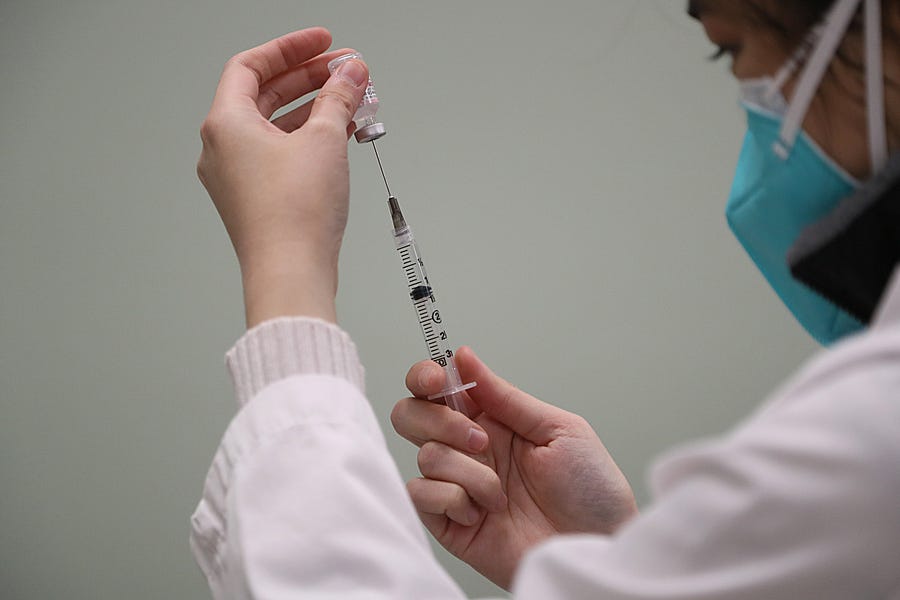A viral social media video insinuates that the COVID-19 vaccine contains trackable microchips that will be injected into vaccine recipients. The video, just under 4 minutes long, is a composite of clips from a number of different sources. Several of the clips have been edited to leave out important information. Together, they create a false impression that those who get vaccinated for COVID-19 will be injected with a “forced chip with a tracking device.”
The video begins with a clip of Bill Gates who appears to be saying: “… innovations like vaccines, we need a measurement system that tracks the vaccines.” The clip, which is edited and manipulated, is actually from the Alliance for Financial Inclusion’s Global Policy Forum in 2013, where Gates says “innovations like vaccines and high yielding crops have changed the future for billions of people.” He later mentions that “we need a measurement system that tracks the progress towards drawing people.” This “measurement system” he speaks of was not in reference to a vaccine, but rather was used in reference to “draw people in” to “benefit from financial activity.”
The viral video also uses a clip from the Christian Broadcasting Network from May, which talks about how “the U.S. government has contracted ApiJect Systems of America to make 100 million pre-filled syringes to quickly distribute a coronavirus vaccine.” The original clip also explains that there is space on each syringe “for an optional radio frequency identification chip containing a unique serial number for each dose. It would not be injected or touch the patient.”
The U.S. government did, in fact, make a deal with ApiJect to manufacture “injection devices” for a COVID-19 vaccine. According to a press release from the U.S. Department of Defense from May 2020, the Department of Defense and the U.S. Department of Health and Human Services announced a “$138 million contract with ApiJect Systems America for ‘Project Jumpstart’ and ‘RAPID USA,’ which together will dramatically expand U.S. production capability for domestically manufactured, medical-grade injection devices starting by October 2020.”
The social media video, however, uses an edited version of this video that leaves out the context that the chip in question is both optional and will be used on the outside of the syringe. It is misleadingly edited to insinuate that a microchip will be “implanted under the loose skin,” as the video says around minute 1:10. This is false.
In the full clip from the Christian Broadcasting Network, ApiJect CEO Jay Walker explains how the optional RFID chip works. “It is designed so that there is no counterfeiting. It is designed so that we will know exactly that the right dose hasn’t expired,” Walker said. “However, that chip only refers to the dose. There is no personal information, no patient information. It’s simply like a barcode, only we know instantaneously where and when that dose has been used.”
A spokesperson for ApiJect, Steve Hofman, told Reuters that this technology is optional and added that the microchip “cannot gather any personal information”. The microchip, he explained, is designed for two purposes: “to allow the health care provider to confirm that the actual injectable and the vaccine in it has not expired and that it is not counterfeit.”
The video also contains authentic footage from a video of a 2019 panel hosted by U.N. Secretary-General António Guterres with Melinda Gates and Jack Ma, founder of Chinese e-commerce company Alibaba, that has also been selectively edited. The video shows Gates saying that technology allows us “to create the world that we want.” In reality, though, the original 2019 footage shows that Gates was referring broadly to the “incredible opportunities” that technology allows for, and how technology can help “create the world that we want, a more just and humane world.”
The video also contains edited footage from a 2019 PBS NewsHour segment hosted by Judy Woodruff on the “benefits and drawbacks of using microchips.” In the original clip, Woodruff says that those “who embrace the idea [of implanting microchips] see it as a way to take back control of their personal data.” The edited video, however, makes it seem like Woodruff is simply saying those “who embrace the idea see it as a way to take back control.”
If you have a claim you would like to see us fact check, please send us an email at factcheck@thedispatch.com. If you would like to suggest a correction to this piece or any other Dispatch article, please email corrections@thedispatch.com.







Please note that we at The Dispatch hold ourselves, our work, and our commenters to a higher standard than other places on the internet. We welcome comments that foster genuine debate or discussion—including comments critical of us or our work—but responses that include ad hominem attacks on fellow Dispatch members or are intended to stoke fear and anger may be moderated.
With your membership, you only have the ability to comment on The Morning Dispatch articles. Consider upgrading to join the conversation everywhere.